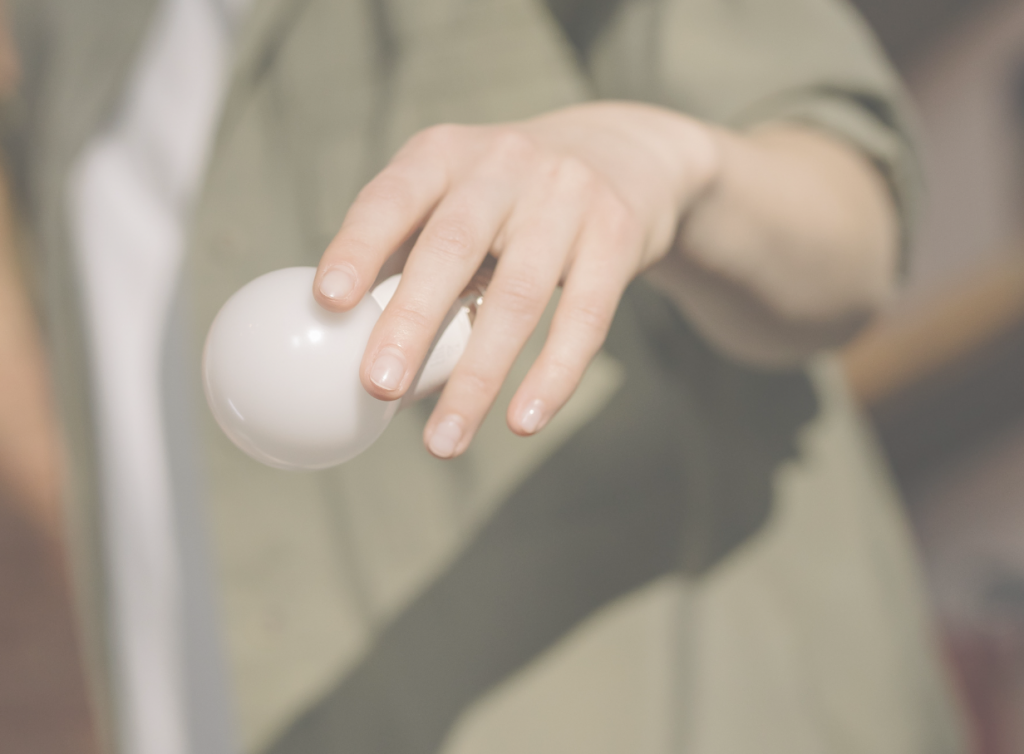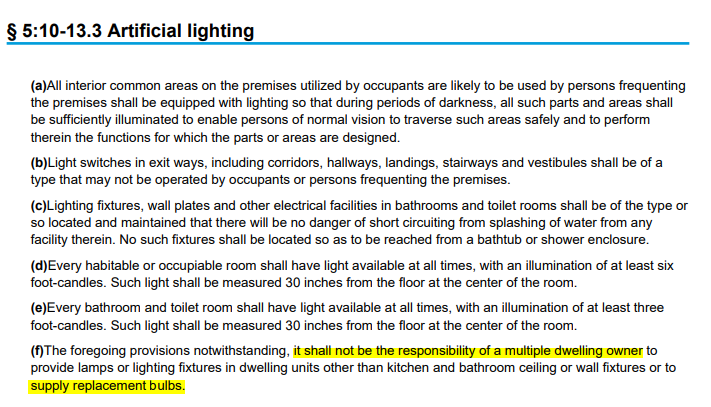
I first became a landlord in my 20s. I knew nothing about managing a rental property. When my first tenants presented me with a list of repair demands including changing a whole bunch of light bulbs that were burned out I immediately changed them.
But the next month there was a new list of demands.
It took a while to learn how to keep my tenants happy without spending my free time changing light bulbs every weekend.
Who is responsible for changing light bulbs in rental properties?
A tenant is responsible for changing light bulbs in a rental property. Light bulbs are considered consumable goods and generally wear out with use over time as a renter leaves a light on. There are a few circumstances when changing light bulbs may not be convenient for a renter.
The following section outlines some of the situations when it may be more appropriate for a landlord vs tenant to change non-working light bulbs.
Responsibility for changing a light bulb based on situation
Terms of Lease – If there is ever uncertainty as to who is responsible for changing a light bulb in a rental property or apartment, then consult the lease. A properly prepared lease should outline details of maintenance responsibilities. In some instances, a landlord may want to handle the task themselves.
Exterior of Rental – While a tenant is actually the one causing wear and tear on a light bulb every time it is turned on, exterior lights can often be difficult to change. They may be mounted very high and require a large ladder to reach. In this case it may be better for a landlord to make the repair.
Common Areas – Multi-unit dwellings often have common areas such as porches, foyers, hallways, and recreation areas that are shared among more than one tenant. In this case it may be difficult or impossible to divide consumption between the renters so the landlord should be responsible for changing non-working bulbs.
Interior of Rental – Any lights within the interior of a rental property are typically controlled by the renter and therefore the tenants responsibility to replace when worn out. If the tenant is not confident in replacing light bulbs on their own, they should seek assistance from the landlord or qualified repair person and expect to pay for that service.
Unsafe Conditions – Regardless of who is responsible for changing a light bulb in a rental, if the task appears to be unsafe, a tenant should consult the landlord before taking action. High ceilings requiring a tall ladder, stairwells, delicate light fixtures, and complicated lighting are better left to a professional to address.
Appliances – Light bulbs in refrigerators and stoves often go out after a certain amount of usage. A tenant should take responsibility to change these.
Personal Items – It may seem obvious, but if a renter has a lamp and the bulb goes out, the renter should replace the bulb.
Broken Light Bulb – Sometimes a tenant’s actions may cause a bulb to be broken such as when kids are playing with a ball. In this situation, because it was not normal wear and tear, the tenant would be responsible to replace the bulb regardless of other conditions.
When is a landlord responsible for changing light bulbs?
There are a few situations when a landlord should consider himself responsible for changing dead light bulbs.
The first is when a property changes tenants. A landlord should turn over the rental to new tenants with everything in safe and working condition. If a light bulb is not working, the landlord should replace it. New tenants should thoroughly inspect a property to make sure everything is working before taking possession.
Another time that the landlord or property manager should change light bulbs is when they are part of a common area of a multi-unit dwelling. This may be a porch or hallway that is used proportionally between tenants.
A landlord should also take ownership of changing light bulbs when doing so would cause danger or risk to the tenant. Requiring a renter to perform maintenance beyond their ability could result in a personal injury lawsuit.
The dangers of changing light bulbs
While changing a light bulb may seem like one of the simplest maintenance tasks in a home, there can be some dangers. Renters often don’t have ladders to reach ceiling light fixtures. This may prompt them to use a chair or other furniture to reach the bulb and that may not be stable.
Light bulbs in stairwells may be challenging to reach, risking a fall.
Chandeliers and other light fixtures often have glass covers which can be difficult to unscrew or reattach.
Using a light bulb with wattage that is too high could cause overheating that could result in shock or fire.
What does the law say about changing light bulbs in apartments
Rental property maintenance laws are defined at a state level or sometimes by a municipality. The majority of state’s require that rental properties are maintained to a safe and habitable condition.
This means the property should be fit for residential purposes throughout the entire term of the lease, and any damage to vital facilities should be repaired by the landlord
A few examples of repairs a landlord would be required to make include a broken toilet, lack of hot or cold water, non-working heat or electricity and broken windows.
If you did deep enough, you might find some code that specifically mentions treatment of light bulbs in rental properties.
In the excerpt below from the NJ Administrative Code, it clearly states that the owner is not responsible for replacing light bulbs.

While you might want to start digging in to see what your state or city has to say, you might want to consider why bother. It is certainly good for a landlord to know the laws pertaining to rental property. But neither party is going to court over a light bulb that costs a few bucks.
A landlord should be well versed on all types of rental property maintenance issues. Then implement policies that avoid any confrontations with tenants.
Is the landlord or the tenant responsible for the cost of light bulbs in a rental property?
Tenants should consider the cost of light bulbs similar to the cost of other consumable goods needed to run a household. For example:
- Batteries in a smoke detector
- Shower curtains
- Trash bags
- Toilet paper
- Gas & electric for appliances
When a light bulb burns out, the renter should accept the cost to replace it. Let’s say an apartment is rented for one year. As soon as the tenant takes possession a bulb goes out. When it gets replaced, that new bulb may last the entire year.
Now let’s say a bulb was replaced just prior to the renter taking possession. They live in the rental for the full year and never have to replace that bulb. In this case the renter goes to use the bulb for a full year without paying for it.
When it comes to light bulbs in common areas, landlords should expect to pay for replacement costs.
Choosing the right light bulb
When a light bulb goes out in a rental property the cost to replace one incandescent bulb is about $2.00. But good luck finding one of those at Home Depot. They may be hard to get. Everyone is pushing newer LED bulbs. They are better and last a lot longer. But, an LED light bulb is a lot more expensive.
A renter should replace a light bulb with the same quality that was there before. If the bulb that burned out is incandescent, it should be replaced with an incandescent bulb.
However, if a renter plans to stay in the rental property for a long time, consider upgrading to a better quality LED bulb. You will save on electricity costs and odds are you won’t have to replace it again.
How to get tenants not to ask about changing a light bulb
A parting tip for landlords who would like to avoid the discussion of who is responsible for changing light bulbs in a rental property. Spell it out in your lease.
Don’t just say that the tenant is responsible. Add a clause that states the exact service fee you will charge to have someone come to change the bulb.
You might include a stipulation in your lease that repairs with a value under $100 are the tenants responsibility. This might help avoid calls when a light bulb goes out, a toilet gets clogged, or the battery in a smoke detector starts chirping.
The bottom line is you don’t want to get a call every few weeks that a light bulb is out. Consider buying a bunch of them and leaving them along with a ladder at your rental. Your tenants will be happier and you can sleep in more often on Saturday morning.
